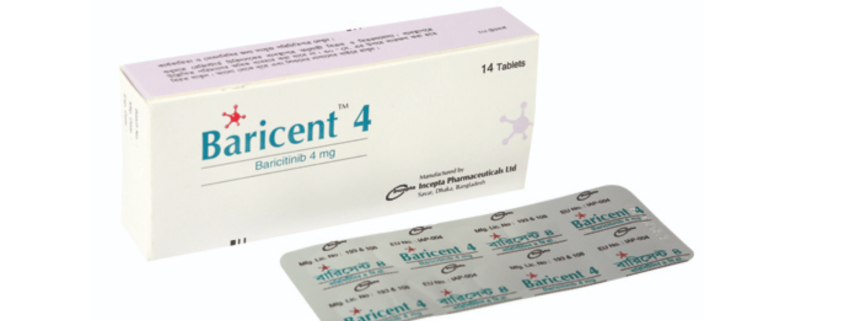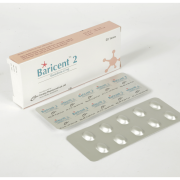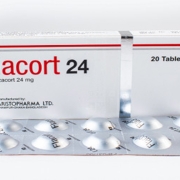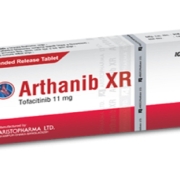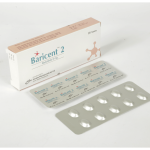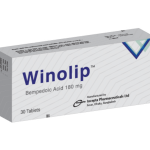Baricent 4(Baricitinib)
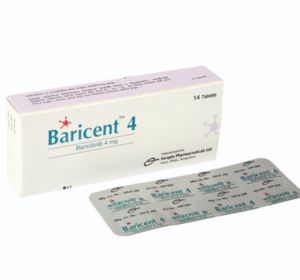
Therapeutic Group: Rheumatoid arthritis
Presentation
Baricentâ„¢ 4: Each film coated tablet contains Baricitinib INN 4 mg
Description
Baricitinib is a selective and reversible inhibitor of Janus kinase JAK1 and JAK2. In isolated enzyme assays, baricitinib inhibited the activities of JAK1, JAK2, Tyrosine Kinase 2 and JAK3 with IC50 values of 5.9, 5.7, 53 and > 400 nM, respectively.
Janus kinases (JAKs) are enzymes that transduce intracellular signals from cell surface receptors for a number of cytokines and growth factors involved in haematopoiesis, inflammation and immune function. Within the intracellular signalling pathway, JAKs phosphorylate and activate signal transducers and activators of transcription (STATs), which activate gene expression within the cell. Baricitinib modulates these signalling pathways by partially inhibiting JAK1 and JAK2 enzymatic activity, thereby reducing the phosphorylation and activation of STATs.
Indications
Emergency use of baricitinib for the treatment of coronavirus disease 2019 (COVID-19) in hospitalized adults
and pediatric patients 2 years of age or older requiring supplemental oxygen, non-invasive or invasive mechanical ventilation, or extracorporeal membrane oxygenation (ECMO).
Dosage & Administration
The recommended dosage of Baricitinib under the Emergency Use Authorization (EUA) is:
• Adults and pediatric patients 9 years of age and older: 4 mg once daily
• Pediatric patients 2 years to less than 9 years of age: 2 mg once daily
Adult Patients
• The recommended dosage in adults with eGFR ≥60 mL/min/1.73 m2 is 4 mg oncedaily for 14 days of total
treatment or until hospital discharge, whichever is first.
• Dosage adjustments in patients with renal or hepatic impairment are recommended
Pediatric Patients
Based on the available information, treatment for COVID-19 for pediatric patients under this EUA is as follows:
• The recommended dosage for patients 9 years of age and older is 4 mg once dailyfor 14 days of total
treatment or until hospital discharge, whichever is first.
• The recommended dosage for patients ages 2 years through less than 9 years ofage is 2 mg once daily for 14 days of total treatment or until hospital discharge,whichever is first.
• Baricitinib is not authorized for patients younger than 2 years of age.
• Dosage adjustments in patients with renal or hepatic impairment are recommended.
Side Effects
Adverse reactions (greater than or equal to 1%) include: upper respiratory tract infections, nausea, herpes simplex, and herpes zoster.
Precautions
• Serious Infections: Avoid use of Baricitinib in patients with active, serious infection, including localized infections. If a serious infection develops, interrupt Baricitinib therapy until the infection is controlled. Do not give BARICITINIB to patients with active tuberculosis.
• Thrombosis: Use with caution in patients who may be at increased risk.
• Gastrointestinal Perforations: Use with caution in patients who may be at increased risk.
• Laboratory Assessment: Recommended due to potential changes in lymphocytes, neutrophils, hemoglobin, liver enzymes, and lipids.
• Vaccinations: Avoid use of Baricitinib with live vaccines
Use in Pregnancy & Lactation
Pregnancy & Lactation: There are no adequate and well-controlled studies in pregnant women. It is not known whether Baricitinib is excreted in human milk.
Pediatric Use: The safety and effectiveness of Baricitinib in pediatric patients have not been established.
Geriatric Use: No overall differences in safety or effectiveness were observed between these subjects and
younger subjects, and other reported clinical experience has not identified differences in responses between the
elderly and younger patients, but greater sensitivity of some older individuals cannot be ruled out.
Hepatic Impairment: No dose adjustment is necessary in patients with mild or moderate hepatic impairment. The use of Baricitinib has not been studied in patients with severe hepatic impairment and is therefore not recommended.
Renal Impairment: Renal function was found to significantly affect Baricitinib exposure. The recommended dose of Baricitinib in patients with moderate renal impairment (estimated glomerular filtration rate (GFR) between 30 and 60 mL/min/1.73 m2) is 1 mg once daily. Baricitinib is not recommended for use in patients with severe renal impairment (estimated GFR of less than 30 mL/min/1.73 m2)
Drug Interaction
The recommended dose of Baricitinib in patients taking strong Organic Anion Transporter 3 (OAT3) inhibitors (e.g., probenecid) is 1 mg once daily.
Storage
Do not store above 30 0C. Keep away from light and out of the reach of children
Commercial Pack
Baricentâ„¢ 4: Each box contains 2 blister strips of 7 tablets.

